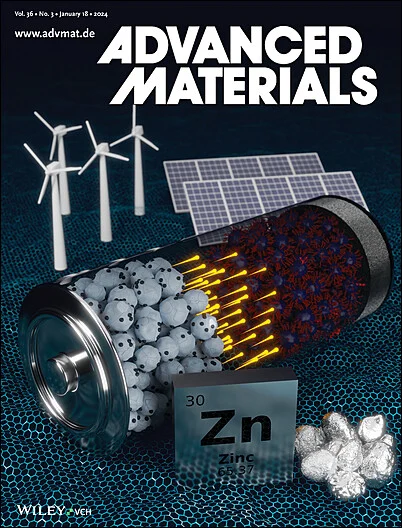Dendrimers Improve Apolipoprotein Nanoparticle mRNA Delivery to Immune Cells.
IF 26.8
1区 材料科学
Q1 CHEMISTRY, MULTIDISCIPLINARY
引用次数: 0
Abstract
Employing messenger RNA (mRNA) for protein production in the liver or for vaccine purposes is a promising therapeutic approach. However, unlocking mRNA's full therapeutic potential requires systemic delivery platform technology with controllable biodistribution features. Apolipoprotein nanoparticles (aNP) containing monovalent ionizable cationic lipids have been shown to functionally deliver mRNA to myeloid progenitor cells in the bone marrow after intravenous administration. Here, the development of polyvalent ionizable cationic dendrimers is reported for incorporation in aNPs to enable efficient mRNA complexation and functional delivery. A library of dendrimers is first rationally designed with diverse hydrophobic core units, a number of branching units, and functionalized terminal units. Upon incorporation, eleven distinct dendrimer-based aNP-mRNA formulations are screened and characterized in vitro for their properties. Based on the screening outcome, four formulations are selected and evaluated their ability to induce functional gene expression in vivo. The results indicate that the lead polyvalent dendrimer-based aNP formulation outperformed formulations containing a clinically approved ionizable cationic lipid regarding gene expression in hematopoietic stem and progenitor cells in the bone marrow after intravenous administration.树状大分子改善载脂蛋白纳米颗粒mRNA向免疫细胞的递送。
利用信使RNA (mRNA)在肝脏中产生蛋白质或用于疫苗目的是一种很有前途的治疗方法。然而,释放mRNA的全部治疗潜力需要具有可控生物分布特征的系统递送平台技术。载脂蛋白纳米颗粒(aNP)含有一价可电离阳离子脂质,经静脉给药后可将mRNA功能性地传递到骨髓中的髓系祖细胞。在这里,多价可电离阳离子树状大分子的发展被报道与aNPs结合,以实现有效的mRNA络合和功能递送。首先合理设计树状大分子库,包括不同的疏水核心单元、分支单元和功能化末端单元。结合后,筛选了11种不同的树突基aNP-mRNA制剂,并对其体外特性进行了表征。根据筛选结果,选择了四种配方,并评估了它们在体内诱导功能性基因表达的能力。结果表明,静脉给药后,在造血干细胞和骨髓祖细胞中的基因表达方面,含铅多价树突状分子的aNP制剂优于含有临床批准的可电离阳离子脂质的制剂。
本文章由计算机程序翻译,如有差异,请以英文原文为准。
求助全文
约1分钟内获得全文
求助全文
来源期刊

Advanced Materials
工程技术-材料科学:综合
CiteScore
43.00
自引率
4.10%
发文量
2182
审稿时长
2 months
期刊介绍:
Advanced Materials, one of the world's most prestigious journals and the foundation of the Advanced portfolio, is the home of choice for best-in-class materials science for more than 30 years. Following this fast-growing and interdisciplinary field, we are considering and publishing the most important discoveries on any and all materials from materials scientists, chemists, physicists, engineers as well as health and life scientists and bringing you the latest results and trends in modern materials-related research every week.
 求助内容:
求助内容: 应助结果提醒方式:
应助结果提醒方式:


